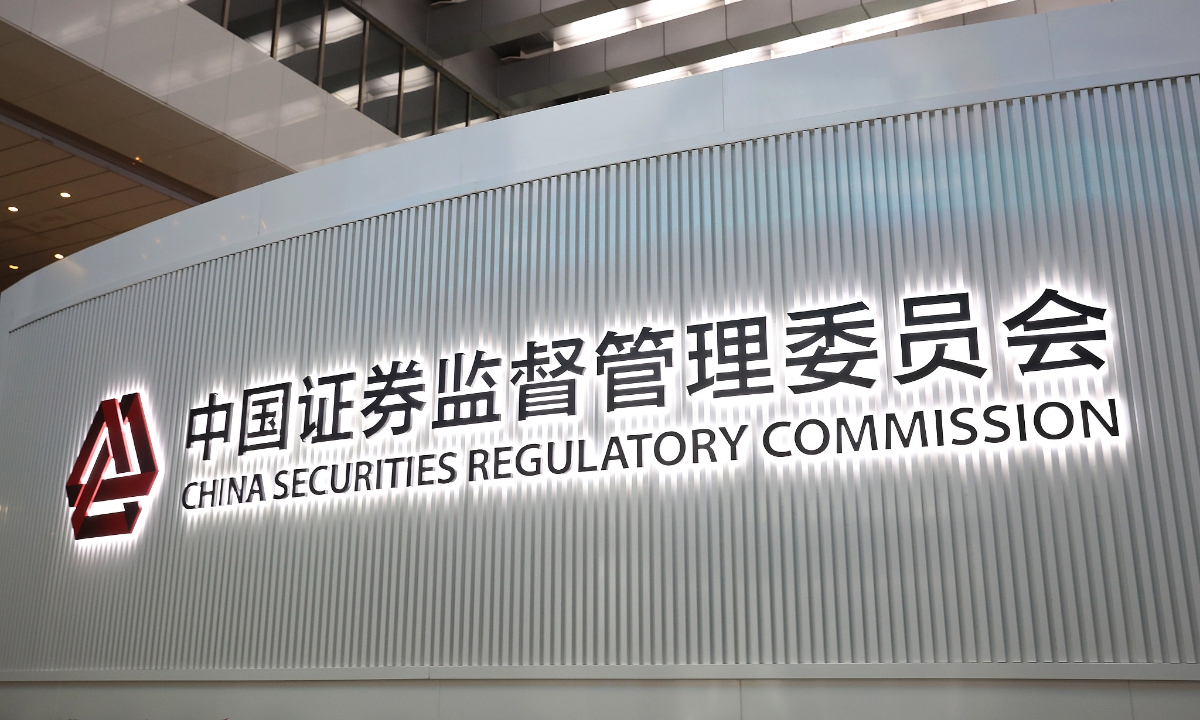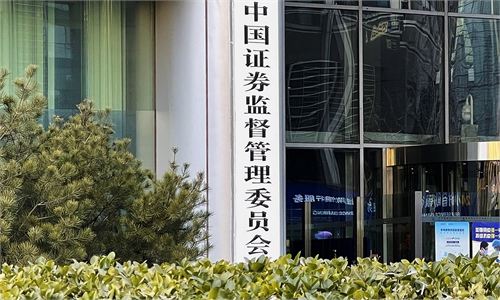China officially implements across-the-board registration-based IPO system, a milestone in capital market reform

China Securities Regulatory Commission in Beijing Photo:VCG
China on Friday announced a detailed mechanism and regulations for a registration-based IPO system across the A-share market. The new rules are effective immediately, signaling the official implementation of the across-the-board registration-based IPOs system that observers hail as a milestone in the development of China's capital market reform.
The launch marks the shift of the world's second-largest stock market from the years-long approval-based IPO system. It will steer the A-share market toward being more market-oriented, law-based and internationalized, under which high-quality companies will gain easier capital market access and wider endorsement from investors, while inferior enterprises will gradually be eliminated, thereby expanding effective fundraising channels to support the real economy, observers said.
The implementation would also align the Chinese stock market closer to the world's most mature markets, analysts said, while expecting that the mechanism, once developed, could serve as a magnet to both a host of Chinese companies listed abroad and foreign capital that is bullish on the Chinese market.
China released 165 rules on registration-based IPOs system on Friday, of which 57 were issued by the China Securities Regulatory Commission (CSRC), and the other 108 accompanying policies were unveiled by stock bourses, National Equities Exchange and Quotations, and China Clear.
The detailed rules mainly involve five areas - simplifying issuance conditions, improving registration procedures, optimizing the sponsoring and underwriting system, improving major assets restructuring system of listed companies, and strengthening supervision and enforcement and investors' protection.
"Implementing the across-the-board registration-based IPOs system is of landmark significance in China's capital market reform… The release of the relevant rules signals that the system's arrangement has basically taken shape, and the registration-based IPOs system is being promoted to all markets, along with all kinds of IPO issuance practices," China's securities regulator said in a statement on Friday.
CSRC noted that the trial run of the registration-based IPOs system in STAR board of the Shanghai bourse, the ChiNext market of the Shenzhen bourse, and the Beijing Stock Exchange, was generally successful, showing that the system has withstood the market test.
The securities regulator announced on February 1 that the time "is ripe to extend the system across the board." Draft rules were also unveiled the same day soliciting public opinions, and it took only 17 days for the launch of the IPO reform across the full spectrum of mainland shares.
The top-design of the new IPOs system brings the capital market reform toward openness and inclusiveness, and one of its ultimate missions is to improve the quality of listed companies, ratcheting up financing channels to serve the real economy, observers said.
"A more stringent delisting system under the new IPO system will have the market play the role of selecting the most valuable stocks and ousting those that deliberately misrepresent companies' financial results," Yang Delong, chief economist at Shenzhen-based First Seafront Fund Management Co., told the Global Times on Friday.
He noted that registration-based IPOs systems, which have been widely used in developed markets, are more market-oriented by allowing the market to determine the number of issues, issue price and whether the issuance is successful.
That also means high-quality Chinese companies, such as those with strong tech prowess and in emerging industries such as new energy, a major driver of China's strategic industrial upgrading, will gain more capital support, while investors will gradually lose their appetite for certain traditional enterprises with outdated capacity, Dong Dengxin, director of the Finance and Securities Institute of the Wuhan University of Science and Technology, told the Global Times on Friday.
Dong said the approval time for IPO application, under the new system, could be drastically reduced to about one month at the minimum, compared with over half a year under the approval-based IPOs system - giving a further leg up to improving the capital market's efficiency.
China's stock market is the world's second largest in terms of market capitalization. In the past decade, the market size has grown by 238.9 percent, providing a strong impetus to shore up economic growth.
Also, "by delegating the approval power to bourses, the CSRC can spend more time on supervision, investigate and punish some illegal actions of listed companies, creating an open, fair and just market environment for investors," Yang noted.
The launch of the registration-based IPOs system also comes at a time when Washington continues its industrial decoupling push and assault on Chinese companies. As a result, Dong said the move could accelerate the homecoming trend of Chinese enterprises listed abroad.
He also expected more foreign capital, betting on the prospects of the world's second-largest economy, to flow into the A-share market through stock connect schemes after the implementation. "It will further leverage the capital market's role in serving the real economy."
In January, net purchases by overseas investors on the A-share market hit a monthly record high of $27.7 billion, the State Administration of Foreign Exchange's deputy administrator and spokesperson Wang Chunying said on Wednesday.


